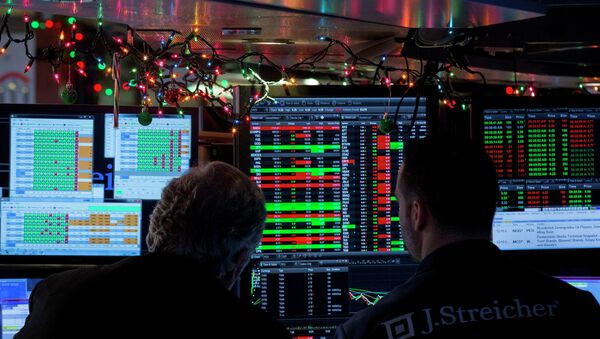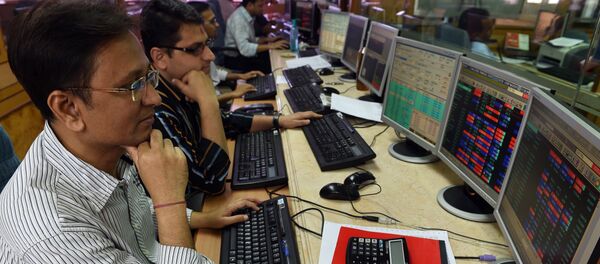The Fed will hardly deliver any surprise as, on the one hand, optimistic growth data might suggest a hike in interest rates sooner than expected, depressing the markets, while on the other, decelerating US inflation hints that a looser monetary environment is still in demand.
The steadily trending strength of the dollar and the devaluation of other major currencies signals further gains in global stocks due to significant money injections into the Eurozone and major Asia-Pacific economies, while the ongoing monetary tightening in the US has attracted a lot of investment money.
One of the brightest spots in Asia-Pacific during Monday's trading was mainland China, as the Communist nation’s Premier, Li Keqiang swore to implement wider stimulus (i.e. money-printing), in case the Chinese economy continues its dramatic slowdown. Li noted such policies may be similar to those practiced, most prominently, by monetary authorities of the Eurozone and Japan in order to boost their economic growth.
That said, China’s already heavily undervalued renminbi is poised to depreciate even more in hopes of boosting the nation’s shaken international competitiveness.
After Li’s promises, mainland China’s stocks skyrocketed to their 5-year highs. Equities of the tech firms Hundsun and Glodon Software rose by 9% as Li stressed the importance of e-commerce. In Hong Kong, China Mobile rallied the most. Shares of Huadong Medicine added 10%. As a result of the strong commercial gains, the Shanghai Composite Index rose by 2.3%, capitalizing on the last week’s 4.1% advance. The CSI 300 added 2.4%, and Hong Kong’s Hang Seng Index rose by 0.5%.
China’s economy is on the edge of collapse at the moment, with the overall economy underperforming significantly as the government set a 7% growth target for 2015, while the nation’s debt is more than twice its GDP, standing at $28 trln. Nonetheless, Li’s promises have eased concerns for a while.
"Investors have nothing to fear now because the message is that if economic growth continues to slow, there will be more stimulus measures," Tian Weidong of the Xi’an-based Kaiyuan Securities said.
In Japan, the Nikkei 225 Index set a new 15-year record high during Monday’s trading, only to slump afterwards, ending the day in the red. Investors are bearish ahead of Tuesday’s Bank of Japan policy decision, which, coming just one day before the US Fed announce theirs, is likely to maintain the stimulus in its existing scale. Only the expansion of money-printing would encourage market participants. However, gains in the banking sector and strong domestic demand, coupled with firm exports, are indicating that the Japanese economy is reemerging from a lengthy deflation.
European markets are expected to extend last week’s gains. In London, the FTSE Index opened 0.4% up, in Frankfurt, the DAX Index was 0.5% in the early trades, while France’s CAC 40 edged 0.4% up. The European Central Bank’s full-scale monetary easing is providing a good influx of the euro-denominated liquidity in the overall Eurozone’s economy, and in financial sector, in particular. The European bond yields have retreated to their record lows, meaning the risk to economic growth in the Eurozone is now minimal.
In the US, inflation is weak, but the Fed is still poised to hike rates in June. Financial markets are nervous in anticipation, as a stronger dollar would decimate their profits. The S&P 500 Index is now standing 3% below its record high, set earlier this month.
The global movement of finance is now looks as follows: the ECB and the BoJ are excessively printing money, helping their respective real economies, and all of that money is absorbed by the US due to tighter monetary policies here. The recent remarks by Li Keqiang suggest the People’s Bank of China (PBoC) is ready to stand in line with the ECB and the BoJ as a yet another global provider of money liquidity.
As more money is printed across the globe, the dollar-denominated prices for goods and services are bound to go down with the US dollar ultimately becoming more of a ‘safe haven’ asset akin to ‘paper gold’ than a practical money equivalent. As a wave of deflation is closer, the US might want to implement some demand-side economics policies in order to overcome a stagnation in prices and effective wages.
Indeed, the dollar-denominated price of crude oil is on the losing streak, with Brent selling at $54.59/bbl, while the US WTI crude is at $44.54/bbl. Commodities, usually valued against the dollar, are mostly down in price, taking a heavy toll on most developing economies.






